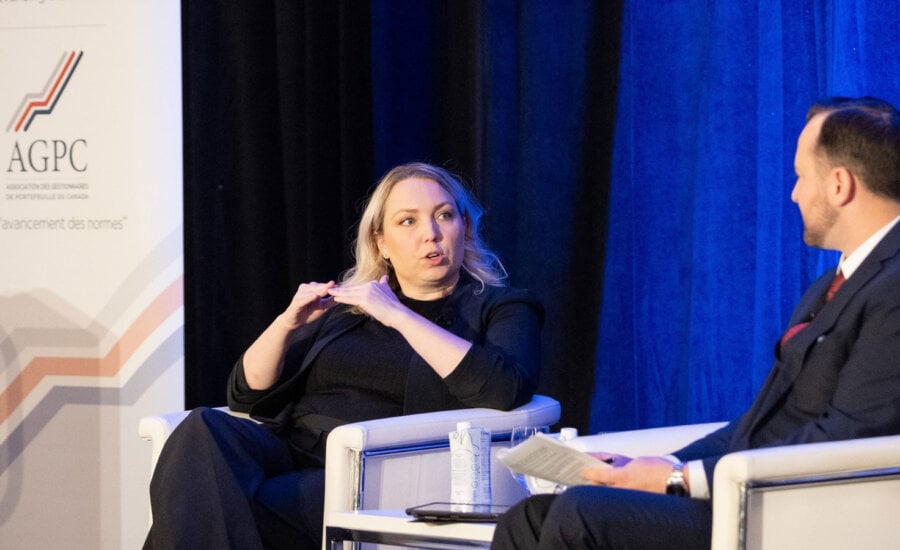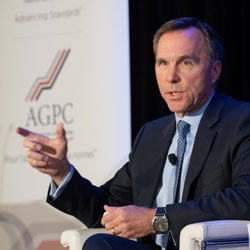Is Canada in a recession?—and other questions about the economy, answered
Canadians have been waiting for a recession and been told that it’s coming for a long time now. So, why are we having a hard time labelling the economy right now?
Advertisement
Canadians have been waiting for a recession and been told that it’s coming for a long time now. So, why are we having a hard time labelling the economy right now?

It feels like Canadians have been talking about a recession forever—or at least since the Bank of Canada kicked off a series of 10 interest rate increases in March 2022, two years into the global pandemic. Are we in a recession?
Yes, technically speaking, we are in a recession, said Frances Donald, global chief economist and strategist, multi-asset solutions team, at Manulife Investment Management. She spoke at the 2023 Portfolio Management Association of Canada (PMAC) national conference, which was aptly named “Hard Truths & Soft Landings,” at the Fairmont Royal York in Toronto on Nov. 15. She was the event’s opening speaker, and she didn’t mince words.
Donald spoke about things that aren’t just on the minds of portfolio managers—though we’re thankful they’re thinking about this stuff—but also on all Canadians’ minds: When will interest rates go down? When will inflation level out? When will the Bank of Canada (BoC) start lowering rates instead of hiking them? Why is employment so strong—or is it? She answered these questions and more, along with other speakers including former finance minister Bill Morneau. Here are the highlights.
Back to Donald’s “yes, technically” answer. “For about two to three quarters, there’ll be a mild recession,” she told the room of portfolio managers. She admits that different economists have different takes but adds that the arguments are over decimal points. “Lucky you,” she said, joking about how economics can be a boring debate. “You will hear the debate [over] whether it’s one quarter of your GDP [gross domestic product] or two quarters. Or, as of right now, is negative point one GDP a recession versus zero? Definitely, yes.”
If we’re in a recession, why doesn’t it feel like a typical one? And why haven’t predictions worked like they did in the past, say, between 1990 and ’92 and in 2008 and ’09, the two most recent recessions?
“I’m having a problem,” said Donald. “Because most of our economic models are based on what happened in the past, and I have a strong suspicion that they’re not going to work for us. There’s a range of things that are happening right now that are completely different [from the past], and not incorporated in most standard economic models.” That includes inflation, labour shortages and that thing that happened in 2020—the global pandemic and its impacts that we’re still feeling today.
Donald said she’s more bullish on the next five to 10 years. “What we see in returns across a range of asset classes is the strongest it has been in my eight years,” she said, noting that Manulife will release more insights in an upcoming capital markets assumptions report. “The horizon looks a lot better for a range of reasons. So, we’re going to work on scenarios acknowledging uncertainty.”

Get up to 3.00% interest on your savings without any fees.

Lock in your deposit and earn a guaranteed interest rate of 3.65%.

Earn 4.50% for 5 months on eligible deposits up to $500k. Offer ends January 31, 2026
MoneySense is an award-winning magazine, helping Canadians navigate money matters since 1999. Our editorial team of trained journalists works closely with leading personal finance experts in Canada. To help you find the best financial products, we compare the offerings from over 12 major institutions, including banks, credit unions and card issuers. Learn more about our advertising and trusted partners.
We know that living in Canada is expensive. The consumer price index (CPI)—widely used as a measure of inflation—was 158.50 in September, a 12-month increase of 3.8%. And Canadian families (four members) will spend $16,288.41 on groceries this year—that’s up $1,065.60 from 2022. It’s hard to picture prices flatlining or going down.
“We think inflation is going to come down to about 2.5%,” Donald said about 2024. She felt the current CPI numbers were “pretty good.”
Soon, said Donald, soon. She went on to suggest the BoC will cut interest rates in early 2024. “Probably in Q1 or Q2, and we’re ahead of the pack on that one. The [U.S. Federal Reserve] could be cutting interest rates by mid-year.” Those of us looking to buy a home or renew their mortgage will be very happy to see a change in mortgage rates in Canada.

Morneau was the PMAC conference’s lunchtime keynote speaker. When asked about the state of the economy, he said: “I wasn’t surprised by the continued strong performance in the U.S. economy. And that, I think, is at least a positive indicator.” He added that a recession will drag on in both Canada and the United States, and that the government is feeling pressured to take action on spending and keep up with services.
“What the government needs to do is to make sure that, fiscally, it’s acting in a prudent fashion,” Morneau said. “From my perspective, I don’t think it’s time for introducing new programs. I think it’s time to carefully open the world’s expenditures.”
That depends. Not just on who you ask, but also the numbers you look at, said Donald. “One of the reasons why we have not yet experienced a recession in the United States, and why it’s been slow in Canada, is because apparently there was excess savings everywhere,” she said. “Here’s the dirty little secret: we actually have no idea how much excess savings is in the system.” The ranges in reports go from $0 to USD$1.5 trillion, and that’s because there are no historical models for what’s happening right now, and none applicable to the current state of the economy.
There are Canadians concerned about their current finances and having enough savings, as well as the ability to save for retirement. Low-risk investments like guaranteed investment certificates (GICs) and high-interest savings accounts are looking pretty favourable with their higher-than-typical rate of return (say, compared to when the BoC rates are lower).
Repairing the economy isn’t about savings or defining a recession. “The excess savings story actually masks the forest for the trees, because we’re talking about the largest transfer of government spending that we have seen in a post-war period in Canada and the United States,” said Donald.
The government typically spends money during hard times, including recessions, to move the economy back into a good state. But government debt is high, and Canadians and Americans feel “worse off.” “For the first time in my career, we were looking at the 10-year yield, and we’re trying to figure out what’s going on in the bond market,” said Donald.
Typically, during a recession in Canada, inflation would fall because Canadians would spend less money. But in today’s global market, taming inflation isn’t just about consumer behaviour, but also about weather, war and other geopolitical issues. “It’s actually coming from a myriad of factors. But moving forward, we know that the drivers and the ways that we calculate inflation are shifting.”
Donald reflected on what she’d said about interest rates, the CPI and a recession. She has some notes.
“Here’s the hard truth about my forecast,” she said. “I have very little faith in it. I am having a complete existential crisis about economics, in general. And I don’t know whether it’s right or not.” She pointed to the labour shortage as a unique economic problem. Not geographically but in all of time. And typically, economists look to the past to help guide forecasts.
“This is actually not a new problem. It started in 2001, and this didn’t just occur because of COVID,” Donald said. With a large segment of Canadians being age 65 and older, the labour shortage is not a surprise to the audience.
“We know there’s a mild recession coming ahead in Canada and in the United States, and we accept that. Many earnings reports have been very clear that that’s what’s on the horizon. But it took so long to hire people—it took two years to get enough staff—that we’re not willing to lay off staff in the next recession. We’ve never seen this before.”
The economic models would point to negative growth and decline, with layoffs and business closures. But it’s not happening as deeply as it has in the past. “We can’t make that assumption anymore. The relationship between companies cutting costs and labour is changing,” said Donald.
And Canada has record growth thanks to immigration, and yes, we’re struggling with a lack of housing supply. “Central banks will have to assess the limits to their power, because we’ve seen the most aggressive tightening cycle in Canada adjusted by debt. Why are home prices still elevated? Because the problem is not the cost of homes.”
Donald said estimates for housing shortages call for aggressive action on the supply side.
“We only have a mild recession in our forecast because we manipulated the unemployment rate forecast to be less hot.”
Now, you might not have read the answers you wanted to read, but at least we know that even the economists and politicians are scratching their heads. Let’s hope the mild recession passes quickly, and that interest rates come down just as quick, too, so we will have some history to look back on and make good fiscal and financial decisions.
Share this article Share on Facebook Share on Twitter Share on Linkedin Share on Reddit Share on Email